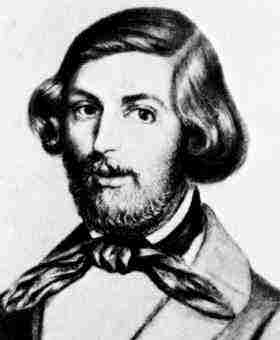- Ferdinand Eisenstein
Infobox Scientist
name = Ferdinand Eisenstein
box_width =
image_width =
caption = Ferdinand Eisenstein
birth_date = birth date|1823|04|16
birth_place =Berlin ,Germany
death_date = death date and age|1852|10|11|1823|04|16
death_place =Berlin ,Germany
residence =
citizenship =
nationality = GER
ethnicity =
field =Mathematics
work_institutions =
alma_mater =University of Berlin
doctoral_advisor =
doctoral_students =
known_for =
author_abbrev_bot =
author_abbrev_zoo =
influences =
influenced =
prizes =
religion =
footnotes =
Ferdinand Gotthold Max Eisenstein (16 April ,1823 –11 October ,1852 ) was a Germanmathematician .Like Galois and Abel before him, Eisenstein died before the age of 30. He was born and died in
Berlin ,Germany .From an early age, he demonstrated talent in
mathematics , and also inmusic . As a young child he learned to playpiano , and he continued to play and compose for the instrument throughout his life.He suffered various health problems throughout his life, including
meningitis as an infant, a disease which took the lives of all five of his brothers and sisters. In 1837, at the age of 14, he enrolled at Friedrich Wilhelm Gymnasium, and soon thereafter at Friedrich Werder Gymnasium in Berlin. His teachers recognized his talents in mathematics, but by 15 years of age he had already learned all the material taught at the school, and he began to studydifferential calculus from the works of Euler and Lagrange.At 17, still a student, he began to attend classes given by
Dirichlet and others at theUniversity of Berlin . In 1842, before taking his final exams, he traveled with his mother to England (where he sought his father). In 1843 he met Hamilton inDublin , who gave him a copy of his book onNiels Henrik Abel 's proof of the impossibility of solving fifth degree polynomials, a work which would stimulate Eisenstein's interest in mathematical research.In 1843 he returned to Berlin, where he passed his graduation exams and enrolled in the University the following autumn. In January 1844 he had already presented his first work to the
Berlin Academy , on cubic forms in two variables. The same year he met for the first time withAlexander von Humboldt , who would later become his protector. Humboldt managed to find grants from the King, the government ofPrussia , and the Berlin academy to compensate for Eisenstein's extremepoverty . The monies, always late and grudgingly given, were earned in full measure by Eisenstein: in 1844 alone he published over 23 papers and two problems inCrelle's Journal .In June 1844 he visited
Carl Friedrich Gauss inGöttingen . In 1845, Kummer saw to it that he receive anhonorary doctorate at theUniversity of Breslau . Jacobi also encouraged the distinction, but relations between him and Eisenstein were always rocky, due primarily to a disagreement over the order of discoveries made in 1846. In 1847 hehabilitated at the University of Berlin, and he began to teach there.Bernhard Riemann attended his classes onelliptic functions .In 1844 he published two proofs of the law of
quadratic reciprocity , and the analogous laws ofcubic reciprocity and quartic (biquadratic) reciprocity. Four years later he was imprisoned briefly by thePrussia n army for his revolutionary activities in Berlin.Eisenstein always had republican sympathies, and while he did not actively participate in the revolution of 1848, he was arrested on
19 March of that year. Although he was released just one day later, the harsh treatment he suffered damaged his already delicate health. But his association with the Republican cause led to his official stipends being revoked, despite Humboldt's tenaciously coming to his defense.Despite his health, Eisenstein continued writing paper after paper on quadratic partitions of
prime numbers and the laws of reciprocity. In 1851, at the instigation of Gauss, he was elected to theAcademy of Göttingen ; one year later, this time at the recommendation of Dirichlet, he was also elected to theAcademy of Berlin .He died of
tuberculosis at the age of 29. Humboldt, then 83, accompanied his remains to the cemetery. He had recently obtained, too late, as it turned out, the funding necessary to send Eisenstein on holiday toSicily .Gauss is said to have claimed, "There have been only three epoch-making mathematicians:
Archimedes , Newton, and Eisenstein". [cite web | title = Review of "Archimedes: What Did He Do Besides Cry Eureka?" |author=Sandifer, Ed| publisher =Mathematical Association of America | url = http://www.maa.org/reviews/archim.html|accessdate=2007-07-23] Gauss's choice of Eisenstein, who specialized innumber theory and analysis, may seem puzzling to many, but Eisenstein proved several results that eluded even Gauss, such as the theorem on biquadratic reciprocity.See also
*
Eisenstein's criterion
*Eisenstein ideal
*Eisenstein integer
*Eisenstein prime
*Eisenstein series
*Eisenstein theorem
*Real analytic Eisenstein series References
External links
*
*
* " [http://www-ub.massey.ac.nz/~wwiims/research/letters/volume6/schmitz/article.pdf The life of Gotthold Ferdinand Eisenstein] " by M.Schmitz ()
*André Weil 's [http://projecteuclid.org/DPubS/Repository/1.0/Disseminate?view=body&id=pdf_1&handle=euclid.bams/1183538204 review] of Eisenstein's collected work, Bulletin of the American Society of Mathematics.
* " [http://fermatslasttheorem.blogspot.com/2005/07/ferdinand-gotthold-max-eisenstein.html Ferdinand Eisenstein] " by Larry Freeman (2005), Fermat's Last Theorem Blog.Persondata
NAME= Eisenstein, Ferdinand
ALTERNATIVE NAMES=
SHORT DESCRIPTION= German Mathematician
DATE OF BIRTH=April 16 ,1823
PLACE OF BIRTH=Berlin ,Germany
DATE OF DEATH=October 11 ,1852
PLACE OF DEATH=Berlin ,Germany
Wikimedia Foundation. 2010.
